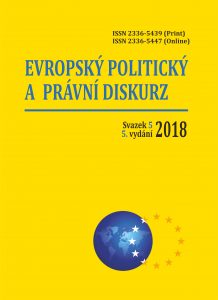DOI: 10.46340/eppd.2024.11.5.5
Iryna Matsyshyna, D.Sc. in Political Science
Vasyl’ Stus Donetsk National University, Ukraine
How to cite: Matsyshyna, I. (2024). Contemporary Migration in the Times of Far-Right. Evropský politický a právní diskurz, 11, 5, 43-52. https://doi.org/10.46340/eppd.2024.11.5.5
Abstract
The modern trend of the emergence of far-right movements is related not only to countries with totalitarian regimes. Recent elections have demonstrated that countries with democratic systems today have a demand for the radicalization of politics. Socio-economic factors in the context of migration policy are not fully implemented by liberal tools, which have proven inadequate in regulating social development in countries open to migrants. This creates a values gap regarding equality between the status of the local population and that of state-supported migrants.
On the other hand, Russia’s information policy deliberately creates a negative image of Ukrainian refugees, exporting a culture of hatred towards national minorities and migrants. This article examines how this impacts the formulation of a unified European policy strategy. The research hypothesis posits that the threat posed by the trend towards far-right movements is not primarily a result of migration policy, which has been reloaded following Russia’s large-scale war against Ukraine. Rather, it is a reaction to the formation of a geopolitical international order through liberal tools that have proven incapable of addressing the challenges of racism and nationalism in European countries.
Issues of social protection from poverty and unemployment, the devaluation of multiculturalism, the artificiality of inclusivity, political corruption, and populism have prompted a reevaluation of liberal ideas, which have taken on new, decisive characteristics in neoliberalism. However, this has not stopped racist, national, and religious intolerance, which, under migration policies aimed at supporting and protecting migrants, has merely become a matter of time before open far-right calls erupt.
Analysis of resolutions and votes in the Parliamentary Assembly of the Council of Europe (PACE) has allowed for the establishment of a certain voting logic on migration issues in relation to the internal political climate of countries that refrain from integrating migrants into their national space. This may indicate that with the rise of far-right sentiments, such trends could increase.
Keywords: far-right, migrants, migration policy, PACE, resolutions, war of Russia against Ukraine.
References
Eurostat (2024). Beneficiaries of Temporary Protection at the End of the Month by Citizenship, Age and sex – Monthly Data. https://ec.europa.eu/eurostat/databrowser/view/migr_asytpsm__custom_12326430/default/table?lang=en
European Commission (2022). Home Affairs Council: 10-Point Plan on stronger European coordination on welcoming people fleeing the war against Ukraine. https://ec.europa.eu/commission/presscorner/detail/en/ip_22_2152
European Commission (2022). Recommendation CM/Rec(2022)16 of the Committee of Ministers
to Member States on Combating Hate Speech. https://search.coe.int/cm#{%22CoEIdentifier%22:[%220900001680a67955%22],%22sort%22:[%22CoEValidationDate%20Descending%22]}
Halperin, S. (2023). The Far-Right in Modern World History. Globalizations, 20(5), 731-751. https://doi.org/10.1080/14747731.2021.1984734
Le Monde [The World] (2022). La Suède lance la chasse aux sans-papiers [Sweden Launches Hunt for Undocumented Immigrants].
https://www.lemonde.fr/international/article/2022/12/07/la-suede-lance-la-chasse-aux-sans-papiers_6153409_3210.html
PACE (2012). The Portrayal of Migrants and Refugees During Election Campaigns. https://pace.coe.int/en/files/18946/html
PACE (2020). Raising Awareness of and Countering Islamophobia in Europe. https://pace.coe.int/en/files/28779/html
PACE (2022a). Challenge, on Substantive Grounds, of the Still Unratified Credentials of the Parliamentary Delegation of the Russian Federation. https://pace.coe.int/en/files/29794/html
PACE (2022b). Humanitarian Consequences and Internal and External Displacement in Connection with the Aggression of the Russian Federation Against Ukraine. https://pace.coe.int/en/files/29794/html
PACE (2022c). Protection and Alternative Care for Unaccompanied and Separated Migrant and Refugee Children. https://pace.coe.int/en/files/30192/html
PACE (2022d). Safe Third Countries for Asylum Seekers. https://pace.coe.int/en/files/31373/html
PACE (2022e). Raising Awareness of and Countering Islamophobia, or Anti-Muslim Racism, in Europe. https://pace.coe.int/en/files/30259/html
PACE (2023a). Deportations and Forcible Transfers of Ukrainian Children and Other Civilians to Russian Federation or to Ukrainian Territories Temporarily Occupied: Create Conditions for their Safe Return, Stop These Crimes and Punish the Perpetrators. https://pace.coe.int/en/files/31776/html
PACE (2023b). Integration of Migrants and Refugees: Benefits for All Parties Involved. Report Committee on Migration, Refugees and Displaced Persons. https://rm.coe.int/integration-of-migrants-and-refugees-benefits-for-all-parties-involved/1680aa9038
PACE (2023c). Social Inclusion of Migrants, Refugees and Internally Displaced Persons Through Sport. https://pace.coe.int/en/files/32985/html
PACE (2023d). Observation of the Parliamentary Elections in Poland. https://pace.coe.int/en/files/33177/html
PACE (2023e). The Challenge of Far-Right Ideology to Democracy and Human Rights in Europe. https://pace.coe.int/en/files/33019/html
PACE (2023f). The Theme of Migration and Asylum in Election Campaigns and its Consequences on the Reception of Migrants and Their Rights. https://pace.coe.int/en/files/33029/html
PACE (2024a). Committee on Migration, Refugees and Displaced Persons. https://pace.coe.int/en/pages/committee-27/AS-MIG
PACE (2024b). The Theme of Migration and Asylum in Election Campaigns and its Consequences on the Reception of Migrants and their Rights. https://pace.coe.int/en/files/33220/html
Venice Commission (2020). Report on Electoral Law and Electoral Administration in Europe. https://www.venice.coe.int/webforms/documents/default.aspx?pdffile=CDL-AD(2020)023-e
True.UA (2018). U 2018 rotsi v Seredzemnomu mori potonuly abo propaly bezvisty 2 275 cholovik
[In 2018, 2,275 People Drowned or Went Missing in the Mediterranean Sea] https://trueua.info/news/u-2018-roci-v-seredzemnomu-mori-potonuli-abo-propali-bezvisti-2-275-cholovik- [in Ukrainian].
Verkhovna Rada of Ukraine (2002). Konventsiya pro status bizhentsiv [Convention on the Status of Refugees] https://zakon.rada.gov.ua/laws/show/995_011?lang=en#Text [in Ukrainian].
Postiyne predstavnytstvo Ukrayiny pry Radi Yevropy [Permanent Representation of Ukraine at the Council of Europe] (2023). Ukrayina i Parlamentska Asambleya Rady Yevropy [Ukraine and the Parliamentary Assembly of the Council of Europe] https://coe.mfa.gov.ua/spivrobitnictvo/ukrayina-v-parye [in Ukrainian].
Suspilne. Novyny [Public. News] (2023). Mayzhe 50 krayin svitu zasudyly RF za deportatsiyu ukrayinskykh ditey [Almost 50 Countries of the World Condemned the Russian Federation for the Deportation of Ukrainian Children]. https://suspilne.media/436617-majze-50-krain-svitu-zasudili-rf-za-deportaciu-ukrainskih-ditej/ [in Ukrainian].
Ukrinform (2024). Rosiyany nezakonno vsynovlyuyut ukrayinskykh ditey – komisar Rady Yevropy
[Russians Illegally Adopt Ukrainian Children – Commissioner of the Council of Europe]. https://www.ukrinform.ua/rubric-society/3816911-rosiani-nezakonno-vsinovluut-ukrainskih-ditej-komisar-radi-evropi.html [in Ukrainian].
UNIAN (2023). Skilky ukrayinskykh ditey deportovano v Rosiyu: Zelenskyy rozkryv motoroshni dani
[How Many Ukrainian Children have been Deported to Russia: Zelenskyi Disclosed the Scary Data]. https://www.unian.ua/society/skilki-ukrajinskih-ditey-deportovano-v-rosiyu-zelenskiy-rozkriv-motoroshni-dani-12255303.html [in Ukrainian].



